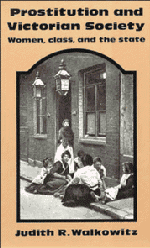Book contents
- Frontmatter
- Contents
- Preface
- Introduction: The Revolt of the Women
- Part I Prostitution, Social Science, and Venereal Disease
- Part II The Contagious Diseases Acts, Regulationists, and Repealers
- Part III Two Case Studies: Plymouth and Southampton Under the Contagious Diseases Acts
- 8 Plymouth and Southampton Under the Contagious Diseases Acts
- 9 The Repeal Campaign in Plymouth and Southampton, 1870–4
- 10 The Making of an Outcast Group: Prostitutes and Working Women in Plymouth and Southampton
- 11 The Hospitals
- 12 The Local Repeal Campaign, 1874–86
- Epilog
- Notes
- Selected Bibliography
- Index
10 - The Making of an Outcast Group: Prostitutes and Working Women in Plymouth and Southampton
Published online by Cambridge University Press: 01 June 2011
- Frontmatter
- Contents
- Preface
- Introduction: The Revolt of the Women
- Part I Prostitution, Social Science, and Venereal Disease
- Part II The Contagious Diseases Acts, Regulationists, and Repealers
- Part III Two Case Studies: Plymouth and Southampton Under the Contagious Diseases Acts
- 8 Plymouth and Southampton Under the Contagious Diseases Acts
- 9 The Repeal Campaign in Plymouth and Southampton, 1870–4
- 10 The Making of an Outcast Group: Prostitutes and Working Women in Plymouth and Southampton
- 11 The Hospitals
- 12 The Local Repeal Campaign, 1874–86
- Epilog
- Notes
- Selected Bibliography
- Index
Summary
With middle-class support, many registered prostitutes in Plymouth and Southampton forcibly resisted the requirement of the Contagious Diseases Acts. Their experience under the acts constitutes an important chapter in the social history of an outcast group in Victorian England. Although the acts were ostensibly passed as sanitary measures to control the spread of venereal disease, their local administration extended well beyond the sanitary supervision of common prostitutes. As single women residing outside their families, registered women were perhaps the most vulnerable members of their community; consequently, official intervention into their lives offered police an easy opportunity for general surveillance of the poor neighborhoods in which they resided. These women were used as a leverage on the working-class community, not simply because of their marginal status within that community, but in good part because they shared social characteristics in common with the mass of the urban poor. Their temporary moves into and out of prostitution reflected the fluid social identity among the casual laboring poor who so violated Victorian society's sense of order and place. In the districts where the acts were enforced, prostitution, petty theft, and the seasonal migration of the poor into the countryside to pick hops and strawberries were all means by which the chronically underemployed endured through hard times. The Contagious Diseases Acts were part of institutional and legal efforts to contain this occupational and geographic mobility.
- Type
- Chapter
- Information
- Prostitution and Victorian SocietyWomen, Class, and the State, pp. 192 - 213Publisher: Cambridge University PressPrint publication year: 1980



